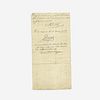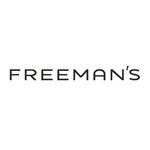[Business & Industry] [Fort de Chartres] Manuscript Financial Document
About Seller
2400 Market St
Philadelphia, PA 19147
United States
Established in 1805, Freeman’s Auction House holds tradition close, with a progressive mind-set towards marketing and promotion, along with access to a team of top experts in the auction business. And now with offices in New England, the Southeast, and on the West Coast, it has never been easier to ...Read more
Two ways to bid:
- Leave a max absentee bid and the platform will bid on your behalf up to your maximum bid during the live auction.
- Bid live during the auction and your bids will be submitted real-time to the auctioneer.
Bid Increments
| Price | Bid Increment |
|---|---|
| $0 | $25 |
| $500 | $50 |
| $1,000 | $100 |
| $2,000 | $200 |
| $3,000 | $250 |
| $5,000 | $500 |
| $10,000 | $1,000 |
| $20,000 | $2,000 |
| $30,000 | $2,500 |
| $50,000 | $5,000 |
| $100,000 | $10,000 |
About Auction
Sep 23, 2021
A collection of books and manuscripts. Curated by Darren WInston, Head of the Books and Manuscripts Department at Freeman's. Freeman's info@freemansauction.com
- Lot Description
A rare and early financial document regarding commerce in Illinois Country on the Western Frontier
Fort Chartres, (Illinois), December 31, 1766. Rare first of exchange financial MS. document, for £100 of Pennsylvania currency, issued to French merchant Daniel Blouin "for value received and place this same to account of your Adventure to the Illinois..."; signed by future mayor of Philadelphia, Matthew Clarkson, as an agent at Fort de Chartres, bottom right; counter-signed by John Jennings, of Philadelphia-based English merchants Baynton, Wharton & Morgan, dated June 6, 1767. Endorsed by Baynton, Wharton & Morgan on verso, dated June 24, 1767; additionally signed by Blouin, in French, on verso, dated January 3, 1767.
A rare first of exchange financial document from the North American frontier, issued from Fort de Chartres while under British control, three years after the end of the Seven Years War (1756-1763).
Fort de Chartres was the seat of the French, and later British, civil and military government in Illinois Country, from 1719-72, and was located on the east bank of the Mississippi River near present day Randolph County, Illinois. Following the end of the Seven Years War, and the signing of the Treaty of Paris (1763), it was transferred to British control on October 10, 1765. It was the last French post in North America to be surrendered under the terms of the treaty. This financial document records early commercial activity in the Western Territories, for a region newly opened for commerce under the terms of the treaty.
The Philadelphia-based English firm, Baynton, Wharton, & Morgan, monopolized the fur trade in the area of Illinois Country at the close of the Seven Years War, taking advantage of newly opened lands and opportunities to trade with the region's indigenous people and white settlers. They were considered one of the more significant commerical enterprises in North America at the time. In 1767, a year after this document was issued, they were awarded a contract by the British Crown to supply provisions and rations for Fort de Chartres, and operated their Western frontier operations from there. Interestingly, Daniel Blouin, recipient of this document, would go on to take over this incredibly lucrative contract from December 1767 to June 1768. He would later form part of a delegation (possibly with the aid of firm partner George Morgan) representing the French in the region surrounding Fort de Chartes. The delegation was sent to New York to negotiate with General Thomas Gage (1718/19-1787), commander-in-chief of the British forces in North America, for the purpose of establishing a civilian government to help represent French civil and trade rights in the now British-controlled region.
Baynton, Wharton, & Morgan's lucrative enterprise eventually failed due to a series of circumstances, but primarily stemming to their contentious and fraught business relations with the French people who inhabited the area, and with the commanders of the Fort, especially between Morgan and Fort commander Lieutenant Colonel John Wilkins. When their contract to supply the Fort was awarded to competing firm, Franks and Company, in 1768, they effectively lost any proftible means to operate in Illinois Country. An attempt to salvage their operations by trading with the indigenous peoples, via British Crown-sponsored agents, likewise proved unsuccessful. The failure of the Stamp Act to produce significant revenue for the British Crown (due in part to the resistance of the American colonists that would go on to ignite the American Revolution ten years later), led to a change in British policy, and expensive government sponsored contracts supplying native tribes with trade and gifts, via firms like Baynton, were suspended. Likewise, competition from French and Spanish traders, operating west of the Mississippi, as well as the waning profitability of the fur trade, pushed them beyond the pale of competitive relevancy.
This document is signed by Matthew Clarkson (1733-1800), future mayor of Philadelphia (1792-96), while serving as an agent licensed on behalf of Baynton, Wharton, & Morgan at Fort de Chartres. He would go on to be elected to the Confederation Congress as a delegate from Pennsylvania in 1785, but ultimately did not attend. He arrived at Fort de Chartres in early 1766 when Baynton, Wharton, & Morgan were just beginning to establish their regional empire. He composed a journal of his journey and time while west of the Alleghenies, providing a key picture of the time and place.
This rare financial document represents a fascinating record of commerical activity in a strategic theater in North America. We can locate only one other ever being offered at auction.
- Shipping Info
-
No lot may be removed from Freeman’s premises until the buyer has paid in full the purchase price therefor including Buyer’s Premium or has satisfied such terms that Freeman’s, in its sole discretion, shall require. Subject to the foregoing, all Property shall be paid for and removed by the buyer at his/ her expense within ten (10) days of sale and, if not so removed, may be sold by Freeman’s, or sent by Freeman’s to a third-party storage facility, at the sole risk and charge of the buyer(s), and Freeman’s may prohibit the buyer from participating, directly or indirectly, as a bidder or buyer in any future sale or sales. In addition to other remedies available to Freeman’s by law, Freeman’s reserves the right to impose a late charge of 1.5% per month of the total purchase price on any balance remaining ten (10) days after the day of sale. If Property is not removed by the buyer within ten (10) days, a handling charge of 2% of the total purchase price per month from the tenth day after the sale until removal by the buyer shall be payable to Freeman’s by the buyer. Freeman’s will not be responsible for any loss, damage, theft, or otherwise responsible for any goods left in Freeman’s possession after ten (10) days. If the foregoing conditions or any applicable provisions of law are not complied with, in addition to other remedies available to Freeman’s and the Consignor (including without limitation the right to hold the buyer(s) liable for the bid price) Freeman’s, at its option, may either cancel the sale, retaining as liquidated damages all payments made by the buyer(s), or resell the property. In such event, the buyer(s) shall remain liable for any deficiency in the original purchase price and will also be responsible for all costs, including warehousing, the expense of the ultimate sale, and Freeman’s commission at its regular rates together with all related and incidental charges, including legal fees. Payment is a precondition to removal. Payment shall be by cash, certified check or similar bank draft, or any other method approved by Freeman’s. Checks will not be deemed to constitute payment until cleared. Any exceptions must be made upon Freeman’s written approval of credit prior to sale. In addition, a defaulting buyer will be deemed to have granted and assigned to Freeman’s, a continuing security interest of first priority in any property or money of, or owing to such buyer in Freeman’ possession, and Freeman’s may retain and apply such property or money as collateral security for the obligations due to Freeman’s. Freeman’s shall have all of the rights accorded a secured party under the Pennsylvania Uniform Commercial Code.
-
- Buyer's Premium



 EUR
EUR CAD
CAD AUD
AUD GBP
GBP MXN
MXN HKD
HKD CNY
CNY MYR
MYR SEK
SEK SGD
SGD CHF
CHF THB
THB![[Business & Industry] [Fort de Chartres] Manuscript Financial Document](https://s1.img.bidsquare.com/item/l/9242/9242315.jpeg?t=1MmbG5)
![[Business & Industry] [Fort de Chartres] Manuscript Financial Document](https://s1.img.bidsquare.com/item/s/9242/9242315.jpeg?t=1MmbG5)











